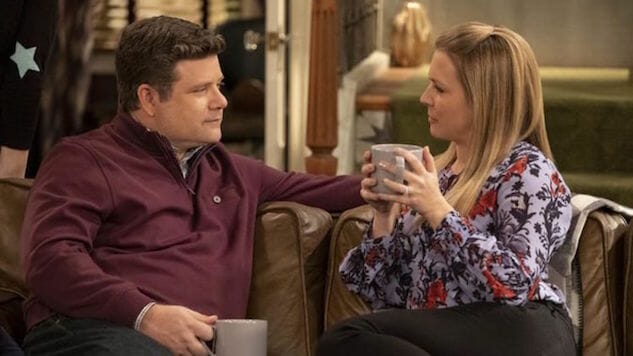How Netflix’s Bizarro Con Artist Family Sitcom No Good Nick Gets Away with Everything
Part 1 left us with questions. Part 2? Oh, it has ANSWERS (and we spoil them all).
Photo Courtesy of Netflix
I… love?? No Good Nick?? I mean, don’t get me wrong, nothing about it should make sense. Sitcoms do not work this way, none of its weirdly random pieces—a live studio audience! A corrupt foster care system! Wacky sitcom family shenanigans! Serialized storytelling! Mob violence!—should fit together at all, let alone combine to make something coherent. But while Part 1 of Netflix’s bizarre-meets-bleak con artist family sitcom managed to overcome every odd to end up “a ripping low-stakes binge,” the recently released Part 2 goes way beyond that. And Part 2 is great.
If I was going to write a straight, spoiler-free review of No Good Nick’s second coming, that would be my big takeaway: Once you get past the (very real) disorientation of watching a young teen girl be existentially misused by every adult in her life while a live studio audience laughs at the tropey sitcom shenanigans she gets up to to pay off the mob, it turns out that No Good Nick is, in fact, excellent. It’s maybe not Russian Doll excellent, but also, on a weird level, it’s not… not? I know, I know. But truly!
In an ideal world, this would be the point at which you X out of this tab, turn on Netflix and queue up the next installment of Teen Girl Con Artist Covers Dad’s Mob Debts While Taking Revenge on Melissa Joan Hart and Sean Astin to see for yourself just how smoothly this show pulls off each of its increasingly ridiculous tricks. But man, I know all too well how obsessively confounding the series’ first ten episodes were, so if what you truly want is just the answers Part 2 gives to every wild question Part 1 prompted? Friends, I am here for you.
For more on No Good Nick’s finale, check out our TV Rewind.
![]()
Question: Russian Doll? Really?
Answer: As weird as it is that No Good Nick (an old-school multi-cam sitcom) is so deeply serialized, that fact is also key. Its arc, like Russian Doll’s, is crafted to take up the precise number of episodes it’s been given. But where Russian Doll had a tight, artful eight, No Good Nick has a sprawling, sitcom-y twenty. So sprawling, in fact, that it isn’t until midway through this newest set of episodes, when the show finally flashes back to what happened to Nick that set her down the path to criminal orphanhood and put a revenge-shaped target on Thompsons’ front door, that creators Keetgi Kogan and David H. Steinberg’s Master Plan starts to make a real case for itself. At that point, though, all the seemingly unconnected details and character choices that spent most of Part 1 just bouncing off each other start weaving together to tell a story that has a lot more emotional heft, and way higher stakes, than any multicam family sitcom has a right to.
Question: How am I supposed to care about that story, though, when the characters are so awful? Like, do the Thompsons even like each other?
Answer: Lol … no. Obviously not. Liz (Hart) is an unyielding control-goblin who lives to play the martyr and laughs at other people’s pain. Ed (Astin) is a selectively incompetent doof who willfully shields himself from having to think about all the parenting slack he’s not picking up. Jeremy (Kalama Epstein) is possibly not a diagnosable narcissist, but he is a self-obsessed, self-righteous, self-satisfied jerkwad. Molly (Lauren Lindsey Donzis) only seems sweet by dint of being a classically pretty teen girl obsessed with the idea of helping others, and not being anyone else in her family. Really, though, she’s just as selfish and primed to see herself as the victim when she doesn’t get her way as her brother and parents are. Literally duh, none of them really like one another.
But, as everything from “The Italian Job” (2.05) onward drives home (with a dagger), that’s exactly the point. Left to their own devices, the Thompsons were all more than happy to be self-serving, self-justifying and dangerously thin-skinned. But then Nick (Siena Agudong) showed up, and while she may have done so with secret and malign intentions, her constant nudges that they think about the consequences their actions have on others ultimately does turn them into better people—people who want to (and can!) actually like each other.
Question: So then, why did Nick and her dad target the Thompsons in the first place?
-

-

-

-

-

-

-

-

-

-

-

-

-

-

-

-

-

-

-

-

-

-

-

-

-

-

-

-

-

-

-

-

-

-

-

-

-

-

-

-








































